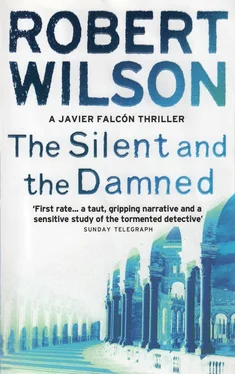'That's probably his vision of death – beautiful but desiccated,' she said. 'You know you can't use any of this in court, Javier.'
'No,' he said, laughing at the absurdity. 'I'm just hoping for an insight. Pablo told me he had everything on show in this collection. He had nothing to hide. What's your overall impression?'
'It's a very male collection. The only female figure is in the Indian erotic painting. Even the non-human pieces are masculine: horses, bulls and centaurs. What happened to his wife, Sebastián's mother?'
'She died of cancer but – this is interesting – not before she'd run off… and I'll quote Pablo directly on this… not before she'd "run off to America with a guy with a big dick".'
'Oh dear,' said Alicia, in mock dismay. "Trouble in the bedroom. Now I'm wondering with all these mirrors, masks and figures whether the biggest role he ever played was himself in his own life, pretending to be a strong, powerful, sexually potent male when in fact… he wasn't.'
'Maybe it's time for us to speak to his son,' said Falcón.
Saturday, 27th July 2002
On the way to the prison, which was outside Seville in Alcalá, Falcón called the director, whom he knew well, and explained the situation. The director was at home but said that he would make all the necessary calls. The prisoner would be made available to him on his arrival and there was no problem about bringing Alicia Aguado in with him. He made it clear that a prison psychologist would also have to be present and a nurse, in case Sebastián Ortega had to be sedated.
The prison, out on a burnt piece of landscape on the road to Antequera, oscillated so violently in the waves of heat shimmering off the ground that at times it completely disappeared to the eye. They drove through the outer gates, between two chain-link fences topped by razor wire, and up to the prison walls, where they parked.
After the brutality of the heat outside the security checks in the cool, institutional corridors were a relief. As they came closer to where the prisoners were kept the stink of incarcerated men became more powerful. The air ticked with bored minds bent on compressing time while they rebreathed the strong hormonal brew of bottled frustrations. They were taken to a room with a single high window which was barred on the outside. There was a table and four chairs. They sat. Ten minutes later the prison psychologist on duty came and introduced himself.
The psychologist knew Sebastián Ortega and believed him to be harmless. He explained that the prisoner was not totally silent but rarely said any more than the bare minimum. A nurse would be along in a moment and they were prepared for all eventualities including violence, although he didn't think it would come to that.
Two guards brought Sebastián Ortega in and sat him down at the table. Falcón had not seen a photograph of him before this meeting and so was unprepared for the man's beauty. He had none of the physical traits of his father. He was slim, 1.85 metres, with blond hair and tobacco coloured eyes. He had high, fragile cheekbones, which didn't look as if they could survive much prison violence. He moved with a slow grace and sat with his long-fingered artistic hands resting on the table in front of him. He used the fingers of one hand to polish each individual nail of the other. The prison psychologist made the introductions. Sebastián Ortega did not take his eyes off Alicia Aguado for one moment and when the psychologist had finished he leaned forward slightly.
'Excuse me,' he said, in a high, almost girlish voice, 'but are you blind?'
'Yes, I am,' she replied.
'That's an affliction I wouldn't mind,' he said.
'Why?'
'We believe too much in what our eyes tell us,' he said. 'They draw us into enormous disappointments.'
The prison psychologist, who was standing at the side of the table, explained to him that Falcón had come here to give him some news. Ortega did not acknowledge him but sat back, nodded, and left his fidgeting hands on the table.
'I'm sorry to have to tell you, Sebastián, that your father died at three o'clock this morning,' said Falcón. 'He took his own life.'
There was no reaction. More than a minute passed while the good-looking face remained unmoved.
'Did you hear the Inspector Jefe?' asked the psychologist.
A single nod and a lowering of the eyelids. The prison officials looked at each other.
'Do you have any questions for the Inspector Jefe?' asked the psychologist.
Sebastián breathed in and shook his head.
'He wrote this letter to you,' said Falcón, laying it down on the table.
Sebastián's hand snapped out of its small unconscious task to bat the letter to the floor. As it skittered over the tiles, tension grew in his body – tendons and sinew stood out in his wrists and forearms. He gripped the edge of the table as if he was trying not to fall backwards and the table shook with a muscular spasm. His face started to break up and with a terrible sob he shunted the chair out from under him and fell to his knees. His features were contorted with pain, eyes squeezed shut, teeth bared. Alicia Aguado put her hands out, feeling the air in front of her. Sebastián's body convulsed once more and he fell to the floor.
Only at this moment did any of the men in the room react. The chairs and table were pulled out of the way and they all stood over Sebastián, who had now gone foetal, holding himself. His head writhed against the polished floor and he coughed up great dry sobs of emotion, as if chunks of pumice were lodged in his chest.
The nurse knelt, opened his bag and took out a syringe. The guards hovered. Alicia felt her way around the table and reached out for Sebastián's trembling frame.
'Don't touch him,' said one of the guards.
She put a hand out which found the back of Sebastián's neck. She stroked him, whispered his name. The convulsions smoothed out. He relaxed his grip on his shins. The sobbing up until that moment had been dry, but now he wept like Falcón had never seen anybody weep before. Tears and saliva poured out of him. He tried to get his hands to his face to hide this awful outpouring, but he seemed to be too weak. The guards stepped back, no longer disturbed, just slightly embarrassed. The nurse replaced the syringe in the bag. The psychologist weighed the situation and decided to let it continue.
After ten minutes of sustained weeping Sebastián rolled on to his knees and buried his face in his arms on the floor. His back shuddered. The psychologist decided that he should be taken back to his cell and given a sedative. The guards tried to get him to stand but he had no strength in his legs. He was unmanageable in this state and they put him down on the floor and went to get a wheelchair. Falcón retrieved the letter and gave it to the psychologist… The guard returned with a trolley from the prison hospital. Sebastián was wheeled away.
The psychologist decided he'd better read the letter to see if the contents would disturb Sebastián any more. Falcón could see that there were very few words on the page.
Dear Sebastián,
I am more sorry than I can ever possibly say.
Please forgive me.
Your loving father,
Pablo
Falcón and Alicia drove out of the bleached landscape of the prison and back into the crushing heat of the city. Alicia Aguado stared out of the window, the lifeless terrain flickered past her unseeing eyes. Questions came to Falcón but he didn't ask them. After that emotional display, everything seemed banal.
'Even after all these years,' said Alicia, 'I'm still astonished by the terrifying power of the mind. We have this organism sitting in our heads which, if we allow it, can completely destroy us to the point where we will never be the same again… and yet it's ours, it belongs to us. We have no idea what we've got sitting on our shoulders.'
Читать дальше
Конец ознакомительного отрывка
Купить книгу












